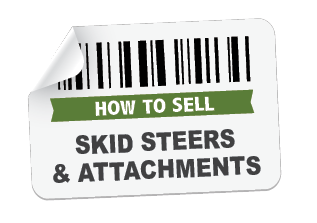 An update on this story from the RLD archive: The 2017 Dealer Business Trends and Outlook Report shows that more than 31% of dealers plan to add skid steers to their lineup this year. That follows what dealers had planned for last year when nearly 24% said they planned to add skid steers. Read more about how dealers are having success with the product category.
An update on this story from the RLD archive: The 2017 Dealer Business Trends and Outlook Report shows that more than 31% of dealers plan to add skid steers to their lineup this year. That follows what dealers had planned for last year when nearly 24% said they planned to add skid steers. Read more about how dealers are having success with the product category.
In Rural Lifestyle Dealer’s 2016 Business Trends and Outlook Report, nearly 24% of respondents said they planned to add skid steer loader products to their portfolio this year. That decision may not be surprising with many economic indicators showing a turnaround in the home building market and at least two manufacturers unveiling new offerings this year. In addition, skid steers could be another sales opportunity for existing commercial zero-turn mower and compact tractor customers.
Dealers who carry the lines say skid steers are unique products with different clientele, but they can coexist under the same roof with other rural lifestyle equipment. There are profits to be made in the skid steer market, but it takes a lot more than parking a couple of machines in front of the store and waiting for customers to come in and purchase them.
Targeting Construction Segment
Sam Morgan, president of Beaumont Tractor in Beaumont, Texas, has been in the equipment business for 45 years and says, “There have been people selling skid loaders as long as I can remember with various levels of success.” The dealership offers the Terex brand and they’re also awaiting the new Kubota skid steers due this summer. They’re a full line Kubota dealer as well as offering Can-Am outdoor power equipment. Morgan says before taking on the line, dealers need to research how much construction is happening in the area. “Number 1, you have to have a demand for it. Not every location has an industrial-based market to make skid loaders profitable,” he says. And, noting the shorter floorplan terms offered by most manufacturers, Morgan says, “When they come due, they’re fairly expensive.”
You May Also Be Interested In...
 Sell More Niche Products That Can Boost Revenues Year-Round — To help you and your sales team learn new selling strategies, we’ve hand-picked several of the most informative stories from our popular “How to Sell” series from our print magazine into a special E-book download – and we’ve made it absolutely FREE to get it into the hands of as many dealers as possible in a time when every potential sale counts.
Sell More Niche Products That Can Boost Revenues Year-Round — To help you and your sales team learn new selling strategies, we’ve hand-picked several of the most informative stories from our popular “How to Sell” series from our print magazine into a special E-book download – and we’ve made it absolutely FREE to get it into the hands of as many dealers as possible in a time when every potential sale counts.
Yes, I Want This Free Special Report.
Morgan estimates that 90% of his sales go to the construction market. “They’re a convenient tool for a lot of applications, but you have to do rental to make it work. Substantial percentages of our units go through our rental fleet and then get sold as used machines somewhere down the line.”
Morgan speculates that while dairy or feedlot applications tend to be consumers of multiple machines, selling just to those markets won’t ensure success. A solid construction base will justify the increased costs of adding a line. Morgan says that compact track machines are outselling skid steer loaders.
Successfully selling skid loaders means reaching out to customers who may not have time to come to the dealership. Morgan advises, “A dealer entering the skid loader market should consider a dedicated outside salesperson and in-field service. We have both and we use them quite a bit. That said, I’m not sure someone new to skid loaders can justify an outside salesperson selling nothing but that product.”
When looking at the attachment business, which comes along with skid steer loaders, Beaumont Tractor sells mostly buckets, pallet forks and grapples. “One of the growing markets is for mulch heads. These are generally around $25,000 and they can walk through thick underbrush and help in site preparation,” says Morgan.
Selling Through Service
Piedmont Tractor in Gainesville, Ga., sells most of its New Holland skid steer loaders to the building market. The dealership also offers LS Tractors and Gravely mowers. General Manager Tony Langford agrees that the construction base is needed to be successful. “Our skid loader sales are 70% into the homebuilding and construction market, with the remaining 30% split between poultry, land clearing, logging and agriculture.” Langford says landscapers are a small, but growing market.
Becoming an Expert
on Skid Steer Loaders
If you’ve never been around skid steer loaders and want to enter the market, you need to know the basics. The customer base for these products will generally know exactly what they’re looking for in terms of features and options. Your challenge is to predict what they want ahead of time so you can order the right machines.
Read MoreWhen dealing with industrial customers, there’s a heightened sense of urgency to do repairs because the operator is losing money every minute the machine is down. For that reason, having good service is one of the best ways to sell skid loaders. Langford says that means dealers who are entering the market will have to make some changes in the shop. “The technician who works on skid loaders is in a ‘whole different ballgame’ than one who does tractor or lawn and garden service,” he says.
Langford says a big benefit of carrying skid steers is their selling season. “They tend to fill the void when the agriculture and lawn and garden business drops off in the period between October and March, with a surge at the end of the year for tax purposes.”
Like many dealers who sell skid loaders, Piedmont Tractor has a rental business and averages about 20 new skid loaders a year in their fleet. Those machines are sold after 1 year to keep the hours down. Langford says, “There are many prospects for previously-rented machines, such as construction customers that got a ‘ding’ on their credit in the housing bust and require a lower priced machine that they can afford to pay for with cash.”
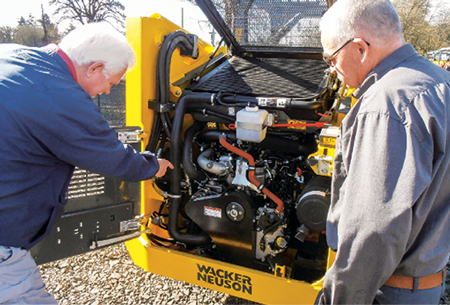
When selling skid loaders, be sure to offer the service to back them up. In order to keep the machines compact, a lot of the components are in tight quarters. Rickreall Farm Supply has factory-trained technicians to service them and who take the time to talk through issues with customers.
Photo Courtesy of NEW HOLLAND
Langford also sees good profits from skid loader attachments, especially the front-mounted rotary cutter. “We sell around 20 of those units a year to people who are trying to reclaim overgrown farmland and who need to cut trees that would be outside the capabilities of a compact tractor and rotary cutter,” he says. He also sells about one set of pallet forks a week. He’s had less success selling dozer blades, so he doesn’t stock them. Langford says margins on skid steer loaders in his area are comparable to those of both compact tractors and lawn and garden equipment.
Finding Opportunities
Dwight Williams of Williams Tractor in northwest Arkansas sells Bobcat skid steer loaders, as well as New Holland and Kioti compact tractors and Hustler and Bad Boy lawn mowers. He says the lines complement each other. Williams also owns a power sports dealership, located next door, which sells the Polaris line.
Williams says the rural lifestyle dealer taking on skid loaders will see some familiar faces as customers. “Many of our landscaping customers have a crew to do installs, which makes them a skid loader customer, and a crew to do maintenance, which means we sell them commercial zero turns.” Williams feels fortunate to be in both markets. “When the housing market crashed in 2008 and skid loader sales dried up, the consumer market helped soften the blow”
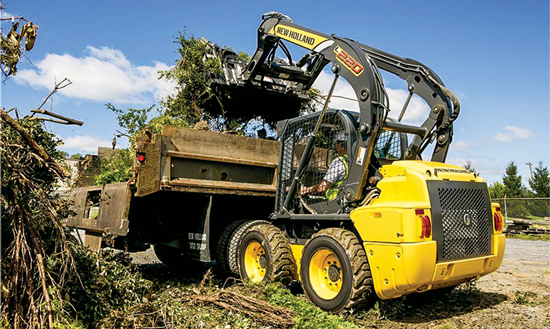
Selling skid loaders opens up additional opportunities to market attachments to the same customers. Demand varies between regions, but potential may exist for sales of attachments, such as brush grapples.
Photo Courtesy of NEW HOLLAND
Williams says that his dealership is established enough that he doesn’t need a dedicated outside salesperson. However, he recommends that someone new to the market hire someone to visit jobsites. He says the typical rural lifestyle buyer is not a candidate for a skid loader. However, he has seen customers purchase tractors and later, as their operation expands, buy a skid steer loader.
In terms of attachments, Williams says dealers need to stock them to sell them. “Here, the hot sellers are post-hole augers, hay spears, angle broom sweepers and brush grapples. We’ve had less success selling the skid-mounted brush hogs, stump grinders and soil conditioners and prefer to stock single units of those types of machines to meet the demand,” he says.
Construction-only dealers can be daunting competition. However, rural lifestyle dealerships do have advantages. A skid steer loader may be the largest dollar item that they sell, but it may be the smallest a full-line, construction-only dealership sells. The salespeople in those types of dealerships may be less aggressive in selling them. Williams says he is able to stay competitive with construction-only dealers, partially because “they’re all closed on Saturdays when we’re open.”
Williams says a rural lifestyle dealer could successfully pursue the construction business. He is seeing a major shift away from the traditional rubber-tired skid steer loaders to compact track loaders because of the better traction. In his area, 7 out of 10 sales are now rubber tracked machines.
Weighing Skid Steer
Rental Opportunities
Dealers say a good way to enter the skid steer loader market is through rental. There are a lot of reasons to take that path, however, there are some things to watch.
Read MoreChanging Demand
Ray Cordrey, president of Buck and Knobby Equipment in Ottawa Lake, Mich., sells the Mustang and Wacker Neuson lines and has been in business since 1968. His business model is primarily rental, accounting for 55% of his volume, with 30% from sales and the remainder from parts and service. A separate wing of the business offers Yanmar tractors and Bob-Cat, Grasshopper and Scag mowers.
Cordrey is less bullish on the skid steer loader market, saying the market is transitioning to rubber tracked machines and mini four-wheel drive wheel loaders. He sees demand decreasing for skid steer loaders, because of the large number of workplace accidents. “Skid loaders allow great visibility to the front, but very little to the sides and almost nothing to the back,” he says. Cordrey also says landscapers are moving away from skid steer loaders because they can leave ruts in yards.
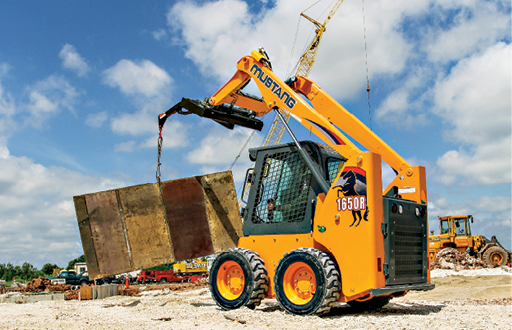
Skid steer loaders are common on jobsites to move material and objects, especially in tight spaces. Visibility forward is outstanding but limited to the side and rear.
Photo Courtesy of MUSTANG
Cordrey has sold some machines to rural lifestyle customers. “They purchase skid loaders after they’ve overloaded their compact tractors and torn the loaders off of them,” he says. Cordrey has seen eroding margins in the skid steer loader business, as major players fight for market share.
Generating Interest
Rickreall Farm Supply in Rickreall, Ore., has been in business since 1947, with most of its business coming from the rural lifestyle segment. The dealership entered the construction business about a year ago and carries the Wacker Neuson line along with Kubota. John Hochstetler, general manager, says the dealership started receiving inquiries when Kubota announced it would be expanding their line of construction equipment. “We had customers asking about the line, but our dealership is not eligible for the construction contract. The Wacker Neuson line was available and we’ve been happy with the product and support we received from them to get started,” Hochstetler says.
The rental business has helped Hochstetler retail new machines. “It allows them to take a machine and try it without a major commitment and that’s worked well for us, especially since it’s a new product in the market,” he says. Rickreall has been primarily selling and renting excavators and wheel loaders and its first shipments of skid and rubber track loaders have only recently arrived. Hochstetler says business has been mixed. “We’ve dealt with our existing people, but we’ve also seen new customers who knew the reputation of the dealership, but have never traded here,” he says.
“Research how much construction is happening in the area…”
Hochstetler says the margins on construction equipment are lower than on rural lifestyle equipment. “Currently, these margins are running about 3-4% lower,” he says. He tries to improve his competitive position by finding better freight rates. He says a full-time dedicated construction equipment salesperson could help them reach their full potential and plans to add that position.
Entering the Market
Selling skid steers offer opportunities, but will require some changes. For instance, you’ll need technicians who are trained to work on industrial equipment and likely an outside salesperson. Proceed carefully with stocking, because skid loaders may have higher invoice costs and shorter terms than your current products. A rental operation is one way to spur sales.
Finally, although skid steers haven’t typically been targeted to rural lifestylers, there are opportunities to sell or rent to landscapers, construction companies of all sizes and even to traditional rural lifestylers with specific project needs.
Originally published in 2015

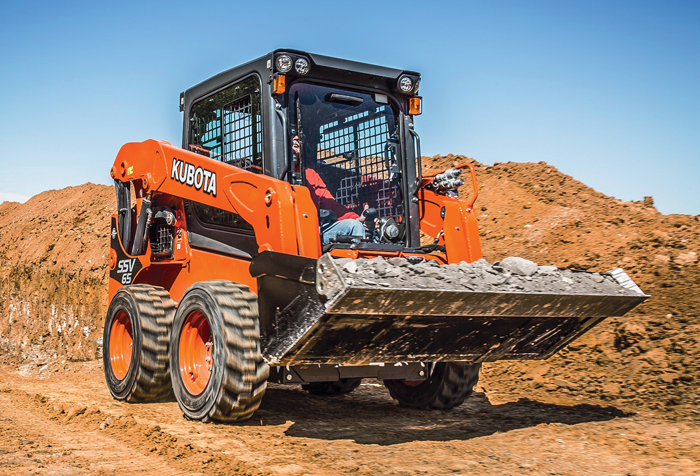





Post a comment
Report Abusive Comment